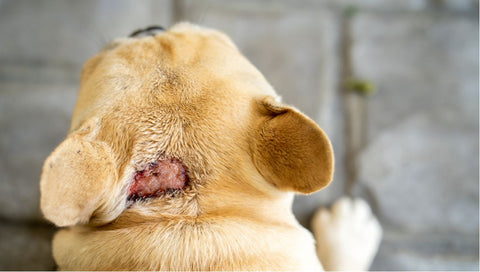One of the most common medical issues we can notice in are hot spots and atopic dermatitis. Unlike humans who show nasal discomfort or hives, dogs who deal with allergies will develop a skin rash and gastrointestinal problems. Allergies in French bulldogs can trigger many conditions such as dermatitis, stomach bloating, hot spots, paw and ear infections, and diarrhea. French bulldog dermatitis has a great chance to be healed if it’s treated in the early stage.
What is French bulldog dermatitis?
French bulldog dermatitis can be an inherited or triggered condition that is followed by itchiness, licking body parts, chewing, scratching, and inability to settle down. Since it can be very uncomfortable, a dog with dermatitis can develop hairless and hot spots. Since the hot spots can easily become infected, this stage should be treated with antibiotics and corticosteroids.
French bulldog dermatitis might be difficult to heal because it’s a very persistent condition that can return over and over again. Therefore, it’s essential to find a permanent treatment solution.

The first step is to discover the trigger. Dogs whose parents suffered from dermatitis will be on a higher tendency to deal with the same issue. Therefore, the point is not only to ‘cover’ the symptoms by using cosmetics. The key is to discover the trigger that can be found in your environment or your French bulldog’s diet.
French bulldog dermatitis should be treated by using dog cosmetics especially made for atopic-prone skin. You shouldn’t use human shampoos and other cosmetics because they’re not made to suit the sensitive dog’s skin.
How to treat French bulldog dermatitis?
This condition should not be treated in home conditions because it can only worsen the symptoms. Depending on the level of severity, your Frenchie might get antihistamines, antibiotics, different supplements, corticosteroids, and medical shampoos.
Antihistamines therapy
Antihistamines help with controlling the itchiness and block the release of histamines. They are completely for use, and some of the most common antihistamines for dogs are Benadryl, Atarax, Aerius, Claritin, and Chlotrimeton.
Medical shampoos
Medical shampoos can contain not only natural ingredients but also antimycotics that help in releasing itchiness. French bulldog shampoos with oatmeal, coconut, and Aloe Vera are known as one of the best for treating dermatitis in dogs.
Corticosteroids only for severe cases
Corticosteroids might seem like the best treatment for itchiness and dermatitis, however, it’s not like that. They’re allowed to use only in severe cases when none of other treatments help. You shouldn’t use them longer than 7 days. Otherwise, they can weaken the skin and make it more susceptible to infections.
Antibiotics
If your dog has developed wounds with discharge, then your vet will probably take the swab and prescribe antibiotic therapy.
Using supplements
Supplements can help in improving the coat and strengthening the skin. By including Omega 3 and Omega 6 fatty acids, and different antioxidants into your Frenchie’s diet, you’ll notice a great shift in the quality of the skin.
Consider changing your French bulldog’s diet
Many studies have shown that French bulldog dermatitis can be solved by switching your pet to a raw diet. Frenchies can show allergies to artificial flavors, colors, by-products, and even grains, so the best choice will be to feed him with a raw diet.
Dress your Frenchie into protective clothes
By dressing your dog into a cotton pajama, you can save him from chewing, licking, and biting his body parts. That’s why we suggest you check our wide assortment of French bulldog pajamas that are made of cotton.


